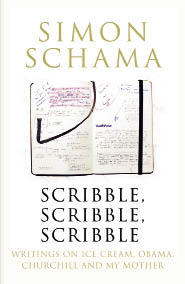‘I Scribble, therefore I am’: this Cartesian quip is typical of Simon Schama, as is the comprehensive subtitle: ‘Writings on Ice Cream, Obama, Churchill and My Mother,’ among other topics, of course.
‘I Scribble, therefore I am’: this Cartesian quip is typical of Simon Schama, as is the comprehensive subtitle: ‘Writings on Ice Cream, Obama, Churchill and My Mother,’ among other topics, of course. This gives the flavour of the delights on offer: a miscellany of observations, reviews, mini-lectures and reminiscences written between 1979 and 2010.
Schama and Starkey, TV’s duo of history gurus, have helped to re-popularise a subject often dismissed as irrelevant; but whereas Starkey can come across as a quirky martinet, here Schama seems as benign and equable as everyone’s ideal grandfather. But don’t be deceived: his mind is as sharp as a scalpel.
Divided into eight sections under broad headings, his subjects range from Charlotte Rampling to Ruskin; art to democracy; fountain pens to food; Cunard to cookery. The warm, witty introduction sets the scene with extended metaphors about his ‘loopy’ handwriting, which he calls ‘the calligraphic equivalent of Tourette’s Syndrome’. From this we learn that he still uses ‘a fountain pen and notebook’, so does, in a sense, ‘scribble’: are these then the doodles or marginalia of the academic mind at rest? No; they are, rather, asides (dramatic or otherwise) from the main themes of a richly varied life.
Describing himself as ‘the Yid kid’ who grew up in Golders Green, passed 11-plus when ‘short-trousered, snake-belted, grimy-kneed, snot-nosed’, then later had difficulty choosing between literature and history for ‘A’ Level and Oxbridge, he sets out aspects of his life, career and core values, often indirectly, when writing, lecturing or travelling. But these asides are versatile in subject and style: sometimes conversational (‘Sail Away’), at others analytical (‘Gothic Language’).
‘Sail Away’ describes life aboard liners from the Titanic to the QM 2, including a storm just before he was due to deliver an on-board lecture:
The Atlantic Ocean … lifted us all up in its big cat’s paw and unceremoniously set us down again … [during] … the immense opera of the deep-grey swell, the rolling waves as bulky and meaty as elephants in a temper.
In ‘Obama Rising’ he describes 2008 as ‘the year of primal national scream in the US’, where, ‘aw shucks will beat silver tongue every time with the regular Joes and Janes’. Except that it didn’t. In ‘Barack Obama’ (2009) he admits that ‘the public voted into power a lanky African-American intellectual’, despite those who had written him off as having ‘all finesse and no killer instinct’. Schama suggests that, ‘Hawaii and the urban black church’, made Obama.
He writes amusingly of the histrionics of history dons in ‘J. H. Plumb,’ an affectionate tribute to a man who was, ‘famously, tigerishly, combative, though also affable and witty’. Schama clearly shares with his former mentor a ‘relish for, and brilliance at, popular history writing and journalism’. His assessment of Plumb’s writing is balanced, analytical and judicious: ‘Plumb, like many of us, remained stymied by an aesthetic in search of a didactic.’
He writes ‘impressionistically’ of Turner’s ‘love affair with gauzy obscurity … shameless rejoicing in the mucky density of oils … the wayward leaks and bleeds of water colours’, which make him the ‘grandfather’ of impressionism.
‘My Mother’s Kitchen’ is one of the most personal and vivid of these pieces:
The kitchen … seemed some sort of battlefield in which … my mother laid about various ingredients until they surrendered [to] the heavy-duty steel hand mincer, polished to military brilliance . . .
He asked her, when she minced her own finger, whether the meal was still kosher or not.
A succinct stylist, Schama is a master of metaphor, the apt, adjectival phrase, rhetoric and irony, even Joycean parody. He has a vividly alliterative way of being gruesomely descriptive: ‘Pork sausages and pallid pies packed with gristly-grey mystery mince …’
This sparkling, effervescent collection bridges the gap between scholarly and popular writing, while avoiding ‘narrative arrogance’ (and most other kinds too). It is excellent holiday reading: dip into this between the sea and the bar and you will find a subtle and amusing companion.
Dr Richard Ormrod teaches Creative Writing for the Open University.






Comments